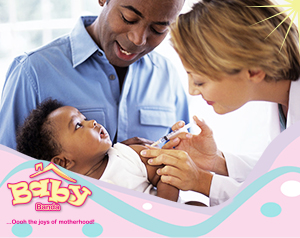Immunization is to administer a vaccine into a healthy person that will prevent that person from getting a certain disease. Though breast milk offers your baby protection against many diseases as it contains antibodies passed from you, it is still important to protect your child from childhood diseases. Numerous vaccines are recommended during childhood as they protect against diseases that used to be devastating and life-threatening like Polio and Tuberculosis.
KEPI (Kenya Expanded Programme on Immunization)
In Kenya, the Immunization Schedule is given by the Division of Vaccines and Immunizations (DVI) in the Ministry of Health and is commonly known as KEPI (Kenya Expanded Programme on Immunization). There are also additional vaccines commonly offered in private hospitals that may not necessarily be in the KEPI schedule.
| Age | Antigen | Disease Prevented | |
| 1 | Birth | BCG OPV HEP.B |
Tuberculosis Polio Hepatitis B |
| 2 | 6 Weeks | DPT HIB HEP B OPV PNEUMOCOCCAL ROTAVIRUS |
Diphtheria, Pertussis, Tetenus Haemophilus Influenza Type B Hepatitis B Polio Pneumonia Rotavirus |
| 3 | 10 Weeks | DPT HIB HEP B OPV PNEUMOCOCCAL ROTAVIRUS |
Diphtheria, Pertussis, Tetenus Haemophilus Influenza Type B Hepatitis B Polio Pneumonia Rotavirus |
| 4 | 14 Weeks | DPT HIB HEP B OPV PNEUMOCOCCAL ROTAVIRUS |
Diphtheria, Pertussis, Tetenus Haemophilus Influenza Type B Hepatitis B Polio Pneumonia Rotavirus |
| 5 | 6 Months | VIT A | Vitamin A Deficiency |
| 6 | 9 Months | MEASLES YELLOW FEVER |
Measles Yellow fever |
Other vaccines not included in the KEPI Schedule but offered in private Hospitals Include:
• Flu Vaccine ( 6 & 7 Months )
• Chicken Pox I & II – 9 & 11 Months
• Menactra 1 (Meningitis) – 9 Months
• MMR – Mumps, Measles and Rubella – 15 Months
• Typhoid – 2 Years
COMMON VACCINE-PREVENTABLE DISEASES
- Whooping cough (Pertussis): This is a communicable disease spread by droplets. Symptoms include severe cough followed by a whoop and vomiting. Leads to malnutrition and can cause death. It is very severe for children under 1-year.
- Diphtheria: This is a highly infectious disease that is spread by droplets. Symptoms include difficulty in breathing, swallowing, enlarged neck. Very severe when it occurs.
- Tetanus: A clinical syndrome involving primarily the central nervous system and resulting from the tetanus toxins. The toxins enter through open wounds, cuts and umbilical stump. Symptoms include stiffness, locked jaw, inability to suckle and muscle spasms. Has very high mortality and is also offered to pregnant mothers to ensure the protection of her newborn baby.
- Measles (Rubeola): This is a highly infectious disease. Symptoms include rash, fever, cough, red eyes. It is associated with blindness, malnutrition, deafness, pneumonia and death.
- Poliomyelitis (Infantile Paralysis). An acute communicable disease that is spread by droplets and faecal contamination. Symptoms include pain and flaccid paralysis in limbs, fever, vomiting. Can lead to permanent deformity and can cause death.
- Tuberculosis: A communicable disease also spread by droplet. Symptoms include fever, wasting, deep chesty cough, night sweats. Leads to lowered resistance to other diseases and may be fatal.
- Hepatitis B: A highly infectious disease that is transmitted mainly at birth but also from person to person by close contact through exchange of body fluids such as saliva, secretions from open wounds, blood, vaginal secretions and semen. Transmission between children is common since they are often more infectious than adults. Complications of infection include acute hepatitis, chronic hepatitis, liver cirrhosis, vascular disease and liver cancer.
- Haemophilus Influenzae b: A bacteria recognized as one of the commonest agents causing pneumonia and meningitis in children.
- Yellow Fever: This is an acute viral haemorrhagic disease transmitted by infected mosquitoes. The “yellow” in the name refers to jaundice that affects some patients. Symptoms include pain in the muscles, back, or abdomen, fatigue, chills, nausea, fever, loss of appetite, or malaise, vomiting, delirium, bleeding, headache, or yellow skin and eyes caused by liver damage.
- Rota Virus: This leads to diarrhoea and vomiting with a high risk of dehydration and death.
- Flu vaccine: The flu is caused by influenza that may lead to pneumonia in children.













